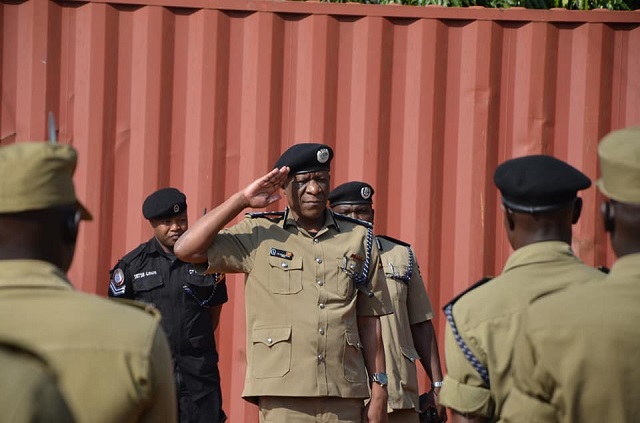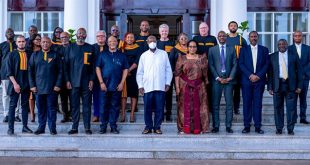
Why activists say IGP Ochola’s latest order is a joke
Kampala, Uganda | RONALD MUSOKE | At a recent event organized in Kampala to commemorate the international day in support of torture victims, Mario Obiga Kania, the State Minister for Internal Affairs asked several uniformed police officers in attendance to stand up.
“These are human beings; they are our brothers and sisters; they are our friends. They are not torturers,” Obiga said, “Some could have tortured like any of us in our communities (but) it is not the uniform that tortures; it is the body in the uniform that tortures.”
Obiga was speaking on June 26 in Kampala at the event organized by the Uganda Human Rights Commission alongside other partners under the Coalition Against Torture in Uganda. This year’s commemoration was held under the theme, “Torture is Real, Speak Out, Take Action.”
Obiga said the government had made strides in eradicating torture in Uganda by entrenching articles against torture in the constitution. He added that the government has also domesticated international conventions on the prevention and prohibition of torture and other degrading treatment or punishment, by enacting the Anti-Torture law in 2012 and passing its regulations in 2017.
The minister reiterated the government’s commitment to have a torture-free Uganda saying: “Torture is an individual act; the individuals who torture just hide under institutions as a cover.”
The Uganda Human Rights Commission’s annual reports consistently rank the police highly when it comes to meting out torture. Obiga who is also the MP for Terego County in West Nile knows this and he said it is high time perpetrators of human rights abuse within police understood that it is both professionally and economically dangerous for one to torture.
Speaking at the same function, the Chairperson of the Torture Survivors’ Association, Uganda (TOSA-U) Fred Baguma said torture must be condemned in the strongest terms possible. “Despite our long silence, today we have spoken more because of the platform we have been given.
“Torture is detestable. These people who torture are sadists, they are criminals, they are barbaric, they are not human, they are anti-Christ because the Bible says love one another and we are here to speak to them,” he said.
In a joint UN statement read by Ayeda Robert Kotchani, the head of the UN Office of the High Commissioner for Human Rights in Uganda, he noted that victims of torture have a right to redress, including compensation and rehabilitation.
Henk Jan Bakker; the Ambassador of the Netherlands in Uganda who represented the development partners under the Democratic Governance Facility (DGF) said that the European Union reiterates its strongest opposition to any kind of acts of torture worldwide.
“Torture is a crime that can target anyone through different forms and in different settings, and all victims of torture, including those who are unacknowledged, neglected or overlooked, are at the forefront of our policy.
Ochola’s memo
It is not clear whether it was Obiga’s tough talk which jolted the police into action but, a week later, on July 03, IGP Martin Ochola Okoth issued a stern memo to his officers.
“Be informed that a new law, the Human Rights (Enforcement) Act, 2019 is now in place. The law has far reaching consequences on the way police performs its duties and the provisions therein have put a lot of emphasis on personal liability for violation of rights by an officer,” noted the memo.
In the letter, Ochola reminds his men and women that, “ Going forward, the entrenchment of human rights in police work will no longer be an option and that responsible officers will now be required to personally incur the cost of compensation in the event of an award by court.
Ochola said the common human rights violations by police that have been documented over the years include but not limited to; detention of suspects beyond 48 hours, torture, denial of a right to a fair hearing (access to a lawyer, corruption, and delayed prosecution).
“This is therefore to instruct all unit commanders to ensure that the observation of human rights is adhered to without fail in all your areas of operation,” he said.
Ochola’s memo attracted praise and some skepticism among human rights activists.
Dr. Livingstone Sewanyana, the executive director of the Foundation for Human Rights Initiative (FHRI) told The Independent on July 16 that IGP Ochola must be commended for being consistent with his drive to ensure that police becomes “human rights-compliant.”
“For a long time police officers have been hiding behind the “order from above” directive but we now know that there has never been any such directive issued to any police officer. The law is now very clear on how to proceed,” said Sewanyana.
“I applaud the IGP for coming up clearly on this matter. If an individual abuses you, we now know how to proceed, police leadership must implore their staff to heed the IGP’s directive and Ugandans must not sit on their rights.”
“We cannot say that there won’t be any human rights abuses but we know that there is this directive that we can use to apprehend the perpetrators of human rights abuses.”
Robert Ssempala, the national coordinator for the Human Rights Network for Journalists in Uganda (HRNJ-U) told The Independent on July 17 that it appears that IGP Ochola has a deep interest in seeing the Uganda Police Force work in a professional way.
“As opposed to the previous administration (under Gen. Kale Kayihura) that often responded with rebuttals and cover-ups whenever the Police was confronted with accusations of torture, Ochola appears to have the goodwill to reform Police,” Ssempala said.
He could be right.
 The Independent Uganda: You get the Truth we Pay the Price
The Independent Uganda: You get the Truth we Pay the Price



